U.S. Sen. Cindy Hyde-Smith, a Republican speaks with supporters at a campaign stop in Tupelo on Nov. 2, 2018, where she made her now-infamous “public hanging” remark. Courtesy The Bayou Brief
JACKSON, Miss.—In extended footage released exclusively by the Jackson Free Press, the context of Republican Sen. Cindy Hyde-Smith’s now-infamous “public hanging” remarks becomes clearer, and the video sheds new light on the senator’s other views including abortion, guns and even the recent history of the Democratic and Republican parties.
In the roughly 12-second clip that drew national attention, Hyde-Smith says that if a certain supporter invited her to “a public hanging,” she “would be on the front row.” The full video also shows that two reporters were present for the remarks, but did not report the “hanging” comment.
That clip, it turns out, is part of nearly 25 minutes of uninterrupted footage filmed by a political tracker of unknown affiliation at a Hyde-Smith campaign stop in Tupelo, Miss., on Nov. 2—just before the Nov. 6 general election. Trackers, who film footage of a candidate for opposing campaigns, were common during the three-way race that saw Hyde-Smith and Democrat Mike Espy advance to a runoff with Mississippi Sen. Chris McDaniel coming in third.
The Bayou Brief, the independent Louisiana outlet that first aired the video of the hanging remark, obtained the footage on the condition that the identity of the tracker—who says his name in the video—would be concealed. The Bayou Brief then provided the footage to the Jackson Free Press to vet and publish exclusively. The only changes made to the footage has been to reduce background noise, enhance vocals for clarity, and mask the voice and name of the tracker who filmed it, per our agreement with Bayou Brief.
Here are some key takeaways from the new footage.
‘Public Hanging’ Remarks in Context
Hyde-Smith’s “public hanging” remark, which drew criticism because of its insensitivity to Mississippi’s dark history of lynchings of African Americans, comes nears the end of the footage.
“This is one of my favorite folks right here,” Hyde-Smith says, calling up a supporter and friend, Colin Hutchinson.
“She helped me out a lot,” Hutchinson says. “She’s a good hometown person. She would do anything for you.”
“I didn’t ask for this, except just then,” Hyde-Smith, who had just implored the crowd to vote for her, says.
Hutchinson continues speaking, though part of his comments are rendered unintelligible by the blaring of a nearby train.
“I support her 100 percent,” Hutchinson says, his arm around Hyde-Smith’s shoulders.
“I would fight a circle saw for him. If he invited me to a public hanging, I would be on the front row,” Hyde-Smith says, drawing applause and laughter from some in the crowd.
“Then do it,” one woman in the crowd can be heard shouting—a detail not present in the original video.
‘What Kind of Pagan Country Do We Live In?’
When Hyde-Smith was not making remarks about attending an execution, she was assuring supporters of her allegiance to conservative causes, like her devotion to gun rights and her total opposition to abortion at all stages.
“I am so firm on protecting children in the womb,” Hyde-Smith tells the crowd. “I said, ‘What kind of pagan country do we live in that says it’s OK to kill your baby, but you’ve got to do it in the first 12 weeks?’ That is wrong. I don’t care, 12, 14. All these states are fighting over how soon, you have to do it in a time period. Think about that … it’s not OK.”
Then, Hyde-Smith singled out Planned Parenthood, which conservative McDaniel—then still in the race for the seat—accused her of supporting.
“Planned Parenthood is one of the worst things that has ever happened to us,” Hyde-Smith said. “We had a bill to defund Planned Parenthood.”
Gov. Phil Bryant Calls Abortion ‘Black Genocide’' in Defense Hyde-Smith
Gov. Phil Bryant said black women are committing "genocide" when they get abortions in a bizarre defense of Sen. Cindy Hyde-Smith's "hanging" remark.
There is only one Planned Parenthood clinic in Mississippi. It is in Hattiesburg and does not perform abortions, but has been a frequent target of conservative Mississippi legislators.
“Many of you may have heard of Sen. Henry Hyde from Oklahoma,” Hyde-Smith told her Tupelo audience. “That was a distant relative. He put in a bill many years ago that we would never use federal funding to fund abortions.”
Hyde-Smith repeatedly misidentified Rep. Hyde as a U.S. senator and also as being from Oklahoma. Hyde was born in Chicago and represented Illinois in the U.S. House of Representatives throughout his career until his death in 2007.
In the 1990s, Hyde was also embroiled in controversy during the politically tumultuous presidency of Bill Clinton. Hyde, who was set to head impeachment inquiries over Clinton’s affair with intern Monica Lewinsky, finally admitted that he had a years-long extramarital affair himself. The admission came after Hyde had castigated Salon, the online news outlet that had discovered the affair, for being a liberal ally of Clinton.
The “Hyde Amendment,” as it is known, does indeed prevent federal funding of abortions except to save the mother’s life or for a pregnancy resulting from incest or rape. In recent years, Democratic politicians like 2016 presidential candidate Hillary Clinton have called for its repeal.
“Senator Hyde, who I got to meet on many occasions, was so smart,” Hyde-Smith said of the House member. “The wisdom he showed to put it in the law, that Planned Parenthood cannot perform abortions on federal dime. That’s been there for a long time. They do other services. We don’t even need them to do other services. We have a decent Department of Health in just about every county I can think of that comes to mind.”
Abortions are a small percentage of the services Planned Parenthood provides (but no abortion in Mississippi). The bulk of services provided by the organization include STD treatment and prevention, and cancer screenings. Also, many women get affordable birth-control pills at the clinics that are often used for health purposes other than preventing pregnancy.
But attacks on Planned Parenthood is a favored political hammer for Mississippi Republicans. In 2016, Gov. Phil Bryant signed a law to block Medicaid reimbursements for Planned Parenthood's services in the state including birth control, cancer screenings and tests for sexually transmitted infections.
Lifetime NRA Memberships for Toddlers
Hyde-Smith also sought to reassure the Tupelo crowd of her devotion to the Second Amendment, contrary to McDaniel’s doubts.
At one point in the video, Hyde-Smith tells the audience she bought her daughter a lifetime membership to the National Rifle Association when she was just a toddler.
“The Second Amendment right, the right to bear arms, one of my strongest beliefs, I have been an NRA member for many, many, many years,” Hyde-Smith says. “My daughter, on her second birthday, got a lifetime membership to the NRA. So anybody who has any question about that, put it to rest.”
Today, a lifetime NRA membership costs $1,500.
At another point earlier in the video, when a volunteer introduced Hyde-Smith by noting that she had the endorsement of “the National Rifle Association, National Right to Life, National Homebuilders’ Association, National Association of Realtors, among several others,” Hyde-Smith appears unsatisfied.
“NRA,” she adds to his list, smiling.
“Yes, NRA,” the volunteer says. The National Rifle Association is the NRA, of course.
At the Neshoba County Fair in August, Hyde-Smith touted her support for a bill that would ban the federal government from keeping any kind of records of gun purchases.
"I just introduced a bill that would not allow any federal dollars to go toward keeping records for anyone purchasing weapons,” she told the crowd, even as some McDaniel supporters jeered her and one called her a “gun grabber.”
“Nothing is more important to me than our gun rights,” she said a few moments later. “I'm a lifetime NRA member."
‘I Didn't Leave the NRA; the NRA Left Me’
In the Jackson Free Press’ interview with Mike Espy in August, Espy said he used to be an NRA member and even received its Silver Rifle Award in 1988 because he had a 100-percent pro-NRA voting record as a congressman. The organization, though, moved too far right for him, he said.
The JFP Interview with Mike Espy
U.S. Senate candidate Mike Espy talked issues with Ashton Pittman. His opponent, Cindy Hyde-Smith, declined an interview.
“I looked at their code and what they believed in and what I believed in, and I decided to renew my membership in 1986,” said Espy, who is a gun owner. “That's because I believe in the Second Amendment—I did then and I do now. I'm not running away from that, but things have changed. You know how Republicans who were Democrats say, ‘I didn't leave the party; the party left me?’ I can just say, ‘I didn't leave the NRA; the NRA left me.’ Because now they're really right wing.”
Espy said he believes in taking steps to curb gun violence by expanding background checks, but he does not support efforts to ban assault rifles nor to arm teachers in classrooms.
“I believe that anyone who has been declared a danger to himself or others should not own a firearm at all. I don't mind assault weapons being sold, but I don't think anyone should own them unless they're 21 years of age,” Espy said. “I think we should have enough technology to outfit every school if it comes to that to detect firearms if they come in the school. That's the farthest I'm going to go. I do not believe teachers need to be armed.”
‘Many Years Ago, Everybody Was’ a Democrat
One of the central attacks McDaniel used against Hyde-Smith was to point out that, until 2010, Hyde-Smith was a Democratic state senator. She changed parties late that year to run for state agriculture commissioner as a Republican.
McDaniel used that point to bolster his contention that Hyde-Smith voted for Hillary Clinton in the 2008 Democratic primary. Still, Hyde-Smith told the Jackson Free Press in August that she would swear on her daughter’s life she did not vote for Clinton.
In the Nov. 2 video, she calls McDaniel a “liar” and a “hater” for the claim.
“You have people that say, ‘She used to be a Democrat,’” Hyde-Smith tells the crowd. “Anybody in Mississippi 40 years old or older has voted for a Democrat. I’ve got news for you. Many years ago, everybody was. Trent Lott started out as a Democrat. Ronald Reagan started out as a Democrat.”
Indeed, most white Mississippians did vote for Democrats 40 years ago because the realignment of the Democratic and Republican parties was not yet complete in Mississippi.
The party switch—with a weakening Republican Party starting to appeal to southern white Democrats (or Dixiecrats)—started as early as the 1940s, but got a jolt of energy in 1964. In July of that pivotal year, as white resistance to civil-rights efforts turned bloody in the South, Democratic President Lyndon B. Johnson signed the Civil Rights Act, enraging white southerners who had identified as Democrats since slavery, secession and Reconstruction times. They had also hated Abraham Lincoln’s Republican Party, which eventually forced the end of slavery and oversaw a Reconstruction that Dixiecrats despised while it lasted and beyond, in no small part because black officials were elected to national office by former slaves who could finally vote.
Then, in August 1964, the Mississippi Freedom Democratic Party, led by civil-rights activist Fannie Lou Hamer, demanded that their delegates be seated at the 1964 Democratic National Convention, rather than the segregationist Democrats—as they were also called—who dominated the official state party. That led to a walkout of the all-white Mississippi delegation, and the MFDP refused a party offer to compromise by giving them just two seats with no voting power.
Segregationist Mississippi politician Charles Pickering—later a prominent Republican judge whose name would surface in the Brett Kavanaugh Supreme Court hearings—attributed the actions of Hamer and her compatriots to his decision to leave the Democratic Party. Pickering said the people of Mississippi "were heaped with humiliation and embarrassment at the Democratic Convention.” He left the party a month later.
That year, the Deep South voted for conservative Barry Goldwater, going solidly Republican for the first time, even as the rest of the country voted to re-elect Johnson. The only states that voted Republican that year were Louisiana, Mississippi, Alabama, Georgia, South Carolina and Arizona. That was a near-stark reversal from the 1956 election; that year, almost every state voted Republican, with the only exceptions being Mississippi, Alabama, Georgia, South Carolina, North Carolina, Missouri and Arkansas.
Southern voters continued to support conservative “blue dog” Democrats for years afterward, largely out of tradition, even as southern Republican strategists such as Haley Barbour of Mississippi and Lee Atwater of South Carolina ushered in the era of coded race appeals—called the "southern strategy"— to draw more conservative Democrats to the GOP.
Hello Obama, Goodbye Blue Dog Dems
The Barack Obama presidency brought an abrupt end to the Blue Dog Democrats, though. In the first midterm after his 2008 election, white southern majorities voted out Democratic incumbents across the region bringing the party realignment to full fruition. By 2016, Republicans enjoyed a supermajority in the Mississippi Legislature, and all statewide elected officials, but one (Attorney General Jim Hood) was Republican.
In Mississippi’s First and Fourth Congressional Districts, voters replaced Democratic congressmen with Republicans. The state’s congressional delegation went from 3-1 Democrat prior to the 2010 midterms to 3-1 Republican afterward. Even two-decades-long incumbent Gene Taylor, who had won his 2008 bid for re-election with about 75 percent of the vote, lost his seat.
Against that backdrop, Hyde-Smith left the Democratic Party a month after the 2010 midterms, announcing that she would join the GOP to run for state agriculture commissioner in December 2010. As a state senator from Brookhaven, she relied on the support of African Americans.
Friday night, we reported that Hyde-Smith attended high school at a segregation academy that was set up in 1970 to bypass integration—Lawrence County Academy in Monticello. Years later, she sent her daughter to Brookhaven Academy—which also began in 1970 as a segregation school. Even in 2015-2016, Brookhaven Academy only had one black student enrolled out of a student body of about 400. The town of Brookhaven, though, is 55 percent black.
At a meeting of the Mississippi Association of Educators in Hattiesburg on Nov. 1, Espy, who is 64 years old, described his own memories of integration in Mississippi schools, when he and his sister were two of just 17 black students at a Yazoo City public school of 800 kids.
“Every day, I was the n-word,” Espy said. “The teachers called me the n-word, practically.”
Hyde-Smith, the Tracker and Pre-existing Conditions
“I love this guy,” Hyde-Smith says early on in the Nov. 2 video as she goes up to her friend Colin Hutchinson for a hug. Then, she turns to the tracker who, minutes later, will capture a different reaction with Hutchinson that will upend her campaign.
“Hello, I’m Cindy Hyde-Smith,” she says, walking straight up to the person who is filming.
“Nice to meet you,” the tracker says, offering a first name.
Hyde-Smith asks for a last name, and the tracker gives it.
“OK, were you on the coast?” she asks.
“I was on the Coast the other day, yes,” the tracker answers. “I was going to ask you, how do you feel about—”
Hyde-Smith throws her hands up to ward off his question. “I’ve got to go meet these people first,” she says, rushing over to talk to some supporters nearby.
The senator does take a question from the tracker later in the video. The tracker asks about whether she supports a lawsuit Mississippi signed onto arguing for the overturning of the Affordable Care Act, known colloquially as Obamacare, which would also overturn the law’s protections for people with pre-existing conditions.
“Very good question. I don’t know anybody who doesn’t have a pre-existing condition. I just don’t,” Hyde-Smith says, offering the same response she had used repeatedly throughout the campaign and used again in the Nov. 20 debate with Espy. “Obamacare has failed Mississippi. It has been so expensive. … Anything that comes about to replace that. We’ve just got to include pre-existing conditions.”
Throughout the campaign, and particularly in the closing months, Espy has focused on the topic of pre-existing conditions. Before the ACA passed, insurance companies could charge people with pre-existing conditions, such as heart disease, diabetes or even allergies, more for insurance or even deny them outright.
Espy charges that Hyde-Smith would allow Americans to lose those protections.
Hyde-Smith has called for an outright repeal of the Affordable Care Act. Though she says she believes in keeping protections for people with pre-existing conditions, she voted to expand access to short-term insurance plans, also known as “junk insurance,” that can discriminate against people with pre-existing conditions, and refuse to cover maternity services, among others.
Journalists Were Present, Did Not Report ‘Hanging’ Comment
After the insurance question, Hyde-Smith offers the tracker the chance to answer another question, but he declines.
The footage reveals that at least two reporters for two different Tupelo outlets were present at the time of the remark that would cause a firestorm days later. Wayne Hereford of Tupelo’s NBC affiliate, WTVA, is visible on the video filming the appearance. At one point, Hyde-Smith joins him for a short interview. Though he is not visible in the footage at the moment the “public hanging” remark is made, a photo he tweeted that morning suggests he was still there at the time that Hyde-Smith was speaking to the crowd.
Northeast Mississippi Daily Journal reporter Caleb Bedillion is present throughout the footage. In the first few minutes, Bedillion enthusiastically greets and then laughs with Hyde-Smith. Later, when introducing the senator, a Hyde-Smith volunteer offers thanks to Bedillion and the Daily Journal, though it is unclear why.
Hyde-Smith’s ‘Public Hanging’ Quip Bombs in State with Most Lynchings
Sen. Cindy Hyde-Smith created a firestorm with her remark about "public hangings" as she faces off against black opponent Mike Espy.
At the moment Hyde-Smith makes her “public hanging” remark, Bedillion is standing nearby with a notepad. Moments later, Hyde-Smith wraps up the event, and Bedillion waves goodbye to an off-camera acquaintance and leaves.
Neither Bedillion nor Hereford reported the “public hanging” comment at the time; the comment did not come to light until over a week later, when Lamar White of the Bayou Brief received the clip as a tip. Bedillion did, however, write a column on Nov. 15 questioning himself on why he did not recognize the hanging quip as a problem.
"The answer, as honest and straightforward as I can say it, is that reporting these remarks didn’t occur to me," Bedillion wrote. "To the best of my recollection, I heard “public hanging” as a play upon the senator’s background as a cattle farmer, a forced and clumsy invocation of frontier bravado.
"More bluntly put, however, I heard what I heard because I am white."
At last week’s debate, Hyde-Smith read a half-hearted apology for the public hanging comment, but quickly shifted blame to Espy, accusing him of “twisting” her words for “personal and political gain.” The Daily Journal's Bedillion was one of four reporters Hyde-Smith approved for the panel; she insisted that no other media or audience members be allowed inside the debate room. After the debate, Espy talked to reporters outside, but Hyde-Smith sent U.S. Sen. Roger Wicker in her place. He said she had to meet her husband.
On Saturday, Nov. 25, an NBC reporter asked Hyde-Smith to clarify what she had apologizing for.
“If I hurt anybody’s feelings, if I hurt anybody’s feelings, you know, we’re just staying on the issues that are on people’s minds,” Hyde-Smith said.
The reporter pressed her again, asking if she could “acknowledge what it was that offended people.”
“You’d have to ask them,” Hyde-Smith said.
“We have, and they’ve articulated to us—” the reporter responded.
“Yeah, and I just apologized for anything that I could have possibly said,” Hyde-Smith responded, ending the conversation.
Hyde-Smith Faces Espy in Nov. 27 Runoff
No matter who wins, the Nov. 27 runoff will be historic. When Gov. Phil Bryant appointed her, Hyde-Smith became the first woman to represent Mississippi in Congress and could be the first duly elected come November. If Espy wins, he would be the first black U.S. senator from the state since Reconstruction ended, when Sens. Hiram Revels and Blanche K. Bruce represented the state in Washington, D.C., until the end of Reconstruction brought the disenfranchisement of black voters.
Around 900,000 Mississippians voted in this year's election—a midterm turnout record of 40 percent, up from 29.7 percent in 2014. Anyone who registered to vote by Oct. 29 will be eligible to vote in the runoff, even if they could not vote in the Nov. 6 election. Voters must have a valid form of photo ID, such as a driver's license or student ID. The Secretary of State's website has a full list of acceptable forms of ID. Polls are open in Mississippi from 7 a.m. to 7 p.m.
Ashton Pittman covers politics and elections for the Jackson Free Press. Follow him on Twitter at @ashtonpittman. Email him at [email protected]. Read more 2018 campaign coverage at jacksonfreepress.com/2018elections.
JFP Editor Donna Ladd also contributed to this report. Follow her on Twitter at @donnerkay.
Correction: A previous version of this story said Daily Journal reporter Caleb Bedillion waved goodbye to Hyde-Smith as he left the Tupelo event, but he contacted the Jackson Free Press Friday to say he was waving to an off-camera acquaintance—not the candidate. We apologize for the misidentification.
More like this story
- Espy to Join Hyde-Smith for Debate As 'Hanging' Backlash Grows
- Republicans Call Espy ‘Sexist’ for Saying He’s Better for Women
- Hyde-Smith Demanded No Audience, No Press for Tonight’s Debate
- Cory Booker Rallies USM Students for Espy
- Hyde-Smith’s ‘Public Hanging’ Quip Bombs in State with Most Lynchings
More stories by this author
- Governor Attempts to Ban Mississippi Abortions, Citing Need to Preserve PPE
- Rep. Palazzo: Rural Hospitals ‘On Brink’ of ‘Collapse,’ Need Relief Amid Pandemic
- Two Mississippi Congressmen Skip Vote on COVID-19 Emergency Response Bill
- 'Do Not Go to Church': Three Forrest County Coronavirus Cases Bring Warnings
- 'An Abortion Desert': Mississippi Women May Feel Effect of Louisiana Case

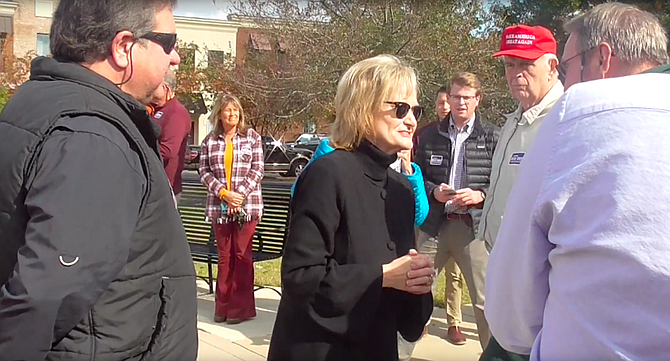
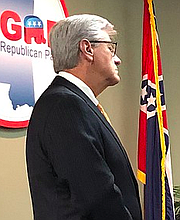
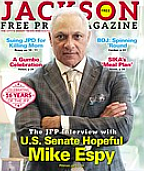
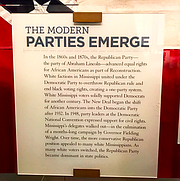

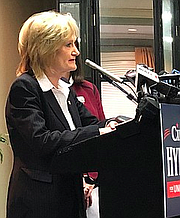

Comments
Use the comment form below to begin a discussion about this content.
comments powered by Disqus